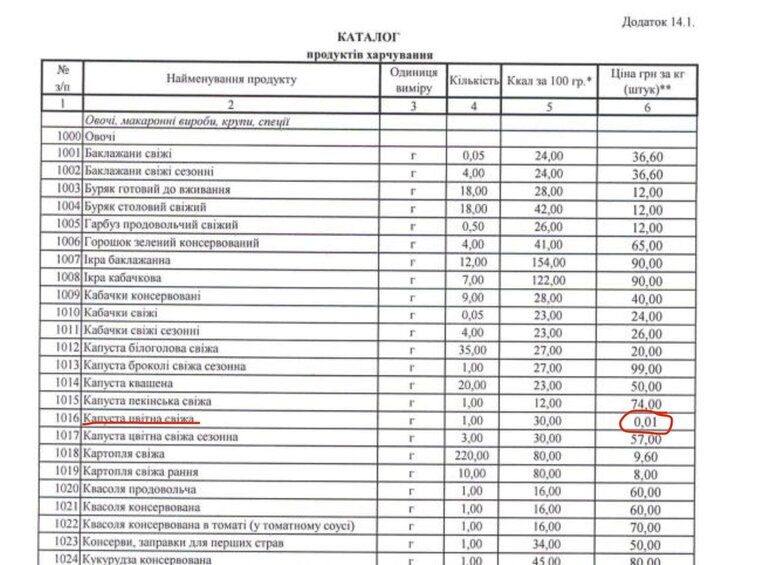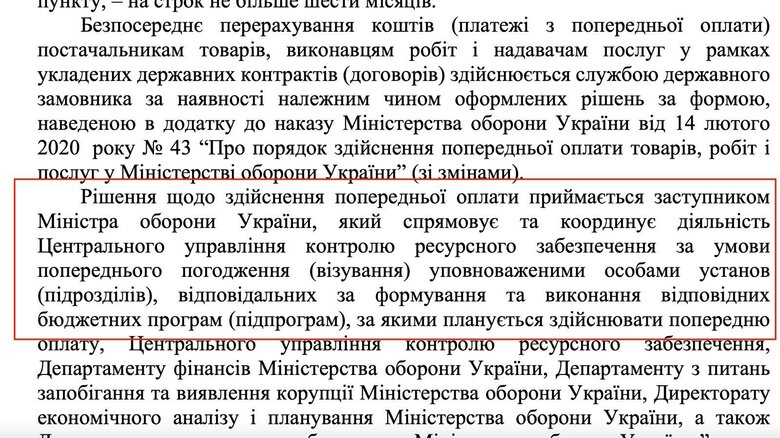Insurmountable corruption risks of Ministry of Defense. Why new scandals are only matter of time
We can punish someone for a crime, or we can prevent that crime from happening. The first is more attractive from the point of view of spectacle, but in fact, after the hundred and third time, it causes only irritation. And the emotional effect is much lower. But the losses remain.
This is especially painful in the defense sector. Because if something is not supplied to the frontline on time, then there is no vital supply.
On Thursday, the NACP presented the results of a study that points to existing corruption risks in the supply of non-lethal goods to the Ministry of Defense.
The authors of the study pointed out the following problems: unsystematic and uncoordinated changes in the legal regulation of defense procurement. In case you didn't know, Resolution 1275, which regulates defense procurement, has been amended 8 times, and Resolution 1178 - 29 times. And this definitely does not contribute to the stability of procurement.
But this is something very incomprehensible from the point of view of an ordinary person who does not deal with procurement on a daily basis. Especially if he or she is not a procurement officer in a military unit, where he or she is actually a machine gunner.
But there are more understandable risks that have already been illustrated by specific examples.
For example, the NACP called "failure to update technical specifications for supplies for a long time and non-transparent procedure for obtaining a certificate of conformity" as a corruption risk.
Do you remember the story about the exorbitantly expensive flasks? In June, ngl.media published a story about the DOT and the purchase of flasks for 355 hryvnias. The authors compared the prices on the Internet and in the National Guard procurement, which were 70 and 150, and decided that the DOT had overpaid.
But the DOT was buying on an urgent need that came from the LFC (Logistics Forces Command). In fact, they had no choice. Because they had to buy the flasks very quickly, with very clear conditions.
In case you didn't know, DOT cannot buy anything, even if it's super-class, American, Norwegian, Ukrainian, and three times cheaper on the market, if it doesn't meet the technical specifications.
The technical specifications were written in 2018. They used an American flask as a model. According to these requirements, the flask must be made of thermoplastic material by blow molding - Eastman Tritan Copolyester TX 1001 polyester or equivalent, the material must be clean, durable, resistant to microwave heating, odorless and free of bisphenol-A.
Thanks to these technical specifications, a monopoly on supply was granted to one group of suppliers who had these flasks in stock. Did LFC know about this nuance? Most likely, yes.
But the most interesting thing is that in fact, the military, with whom the author spoke after the scandal, expressed sincere surprise, and why they need the flasks now, if no one uses them.
Next year, the Ministry of Defense is not planning to buy any more flasks, cauldrons, or covers for them. But what does it matter if someone has already made tens of millions on this?
Similarly, the Ministry of Defense is not planning to buy rubber boots now. But a year ago, 125,000 of them were bought from the Trade Lines Retail company owned by the Hrynkevych family. And only Hrynkevych's company participated in that tender, and the delivery time was only a month. Surely it wasn't a "unpacking" for a specific supplier?
There is one more important nuance in the story of the flasks. It was an urgent purchase. Unfortunately, last year, the Public Anti-Corruption Council at the Ministry of Defense pointed out that this form, despite being clear for martial law, also contains very serious corruption risks. After all, it is followed by a quick procurement under non-competitive procedures.
For example, last year this happened a lot with fuel and motor oils. Obviously, the army cannot fight without fuel. But here's the story: as of July 2023, not a single contract for the purchase of motor oils for the first half of the year had been fulfilled. The contracts were extended with additional agreements. At the same time, rapid procurement was going on in parallel to meet urgent needs.
Now, the NACP has also classified the use of the "urgent need" ground for non-competitive defense procurement procedures as one of the corruption risks in the work of the Ministry of Defense. The only good thing is that already this year 90% of fuel purchases from the DOT were made under competitive procedures.
Another important point of the NACP's comments is "the lack of a unified approach to determining the estimated and expected value of defense goods, in particular, when purchasing food."
It is worth noting that the MoD Public Anti-Corruption Council has repeatedly pointed out that keeping procurement by catalog rather than by individual categories of goods actually puts on hold this segment for a limited group of suppliers who are a kind of food "Rosukrenergo" - intermediary companies that mostly not only do not produce anything but also do not supply goods to the frontline, because subcontractors do.
In the spring, IACC (Independent Anti-Corruption Commission) analyzed procurement over the past year, which was carried out by both the collegial body of the Ministry of Defense and the DOT.
The analysis revealed that, for example, the Trade Granit company, which is now involved in several scandals with the quality of food supplied, in 2023 listed prices for a number of products in its catalog at UAH 0.01 per kilogram. The company had such prices for nectarine, cherries, cauliflower, raspberries, and fresh cucumbers. Obviously, such prices could not exist on the market. But this allowed the company to win the tender.
According to the analysis conducted by the MoD Public Anti-Corruption Council with the support of IACC, the price difference in the catalogues of different companies was sometimes 900%.
Currently, participating companies are prohibited from reducing prices for certain goods by more than 40% of the State Statistics Service price, but suppliers often lower them by 35%.
For those items where they are sure that a military unit will not order it.
The NACP also pointed out that among the corruption risks is the selectivity and unclearness of the subscription criteria.
For example, according to the DOT's response to IACC's request, 8 companies among food suppliers received such subscriptions, including YUH PROD TORH LLC; Busk Canning Plant LLC; Contract Prodreserve 5 LLC; FOODGRAND LLC; ADELIN LLC; Okhtyrka Meat Product LLC; TRADE GRANIT INVEST LLC; and ASIKS GROUP LLC.
Meat Prom, Cherkasy Meat Processing Plant and Tvii Khlib did not receive any.
Advance payments are made in accordance with an order of the Minister, which stipulates that the relevant Deputy Minister gives permission for such subscriptions. There are no other clear criteria for such payments.
In total, the NACP has identified 3 systemic corruption risks and 8 that arise directly during procurement.
Finally, I will focus on the risk related to the procedure for checking business partners.
According to the NACP analysts, vesting the SE DOT with the authority to conduct inspections at the stage preceding the conclusion of the contract could help prevent the conclusion of contracts with dishonest contractors and significantly reduce the risk of damage to the state budget.
In particular, similar practices exist in the UK and Canada.
Pursuant to Article 16(1) of the Law On Public Procurement, the customer requires the participants of the procurement procedure to submit documented information on their compliance with the qualification criteria. Part 2 of Art. 16 of the Law stipulates that the customer establishes one or more of the following qualification criteria: availability of equipment, material and technical facilities and technologies; availability of employees with appropriate qualifications who have the necessary knowledge and experience; availability of documented experience in the performance of a similar contract (contracts) to the subject of procurement.
Despite this, some of the food suppliers are intermediary companies without their own production facilities with rented warehouses, and clothing suppliers do not have their own sewing capacity.
Therefore, the Ministry of Defense now needs not only to revise some of the technical specifications, which are obviously written for one manufacturer but also the incoming qualification criteria for tenderers to prevent companies from the "ACME" cohort from supplying the army from the very beginning.
Otherwise, it is only a matter of time before new supply scandals arise.
Tetiana Nikolaienko, Censor. NET




